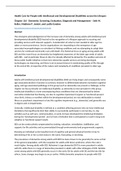Samenvatting
Gerontology summary literature week 7
- Instelling
- Rijksuniversiteit Groningen (RuG)
Dit document bevat de samenvatting van de verplichte literatuur van week 7. De literatuur wat samengevat is: - Dementia: Screening, Evaluation, Diagnosis and Management - Seth M. Keller, Matthew P. Janicki, and Lucille Esralew - The Behavioral and Psychological Symptoms of Dementia in Down Syndr...
[Meer zien]





